When it comes to our furry friends, we often wonder about their overall health and well-being, including their dental health. One common question that arises is, can dogs get cavities? In this article, we will explore the topic of dog dental health, shedding light on cavities, canine oral hygiene, and more.
Key Takeaways:
- Dental disease is a common condition in dogs, with over 80% of dogs over the age of three having active dental disease.
- While dogs can get cavities similar to humans, the most common dental problem in dogs is periodontal disease.
- Preventing dental disease in dogs involves daily tooth brushing and providing dental chews and toys.
- Cavities in dogs can be challenging to spot and are usually diagnosed through a dental examination by a veterinarian.
- Professional dental cleanings performed by a veterinarian are essential for maintaining a dog’s dental health.
How Dental Disease Forms in Dogs

Dental disease in dogs is a common problem that can lead to various oral health issues. Understanding how dental disease forms in dogs is crucial in preventing and managing these problems. While cavities are rare in dogs, plaque and tartar buildup, along with periodontal disease, are the primary concerns.
It all begins with the formation of plaque, a sticky film that develops on the tooth’s surface. Plaque is composed of bacteria, food particles, and saliva, and if not removed, it can lead to various dental problems.
Tartar Accumulation:
If plaque is not sufficiently removed through regular dental care, it can mineralize and harden into tartar. Tartar is a rough substance that sticks to the tooth’s enamel, making it difficult to remove by brushing alone.
Gingivitis and Periodontal Disease:
Tartar accumulation can irritate the gums and cause inflammation, leading to gingivitis – the initial stage of periodontal disease. This can result in red, swollen, and bleeding gums.
“Preventing dental disease in dogs involves daily tooth brushing, using toothpaste specifically formulated for dogs.”
Prevention and Care:
In order to maintain your dog’s dental health, it is important to implement a dental care routine. This includes:
- Regular tooth brushing using dog-specific toothpaste.
- Providing special chew toys and dental treats that promote chewing and help remove plaque.
- Incorporating dental diets that are designed to reduce plaque and tartar buildup.
| Cavities in Dogs | Dental Care for Dogs | Dog Tooth Decay |
|---|---|---|
| Less than 10% of dental problems | Daily tooth brushing | Rare in dogs |
| Most common dental problems in dogs: | Using toothpaste formulated for dogs | Primary concerns: plaque, tartar buildup, periodontal disease |
| – Periodontal disease | Special chew toys and dental treats | |
| – Fractured teeth | Dental diets |
Diagnosing and Treating Cavities in Dogs
Cavities in dogs can be challenging to identify and require a veterinary examination for a proper diagnosis. During the examination, the severity of the cavity and any associated damage will be assessed. In some cases, a probe exam under anesthesia may be necessary to evaluate the extent of the cavity. It is important to note that cavities in dogs have five stages of development, ranging from affecting only the enamel to root exposure. Timely identification and diagnosis are crucial in order to determine the appropriate treatment.
When it comes to treating cavities in dogs, the options depend on the severity of the cavity. In less severe cases, a tooth extraction may be recommended to remove the affected tooth. However, in situations where the cavity has not reached the root, root canal therapy may be a viable treatment option to save the tooth. After cavity treatments, monitoring your dog for any abnormal behavior or mouth issues is essential. Pain relief medication and a temporary change in diet may also be necessary to aid in the recovery process.
Dental Care Tips for Dogs
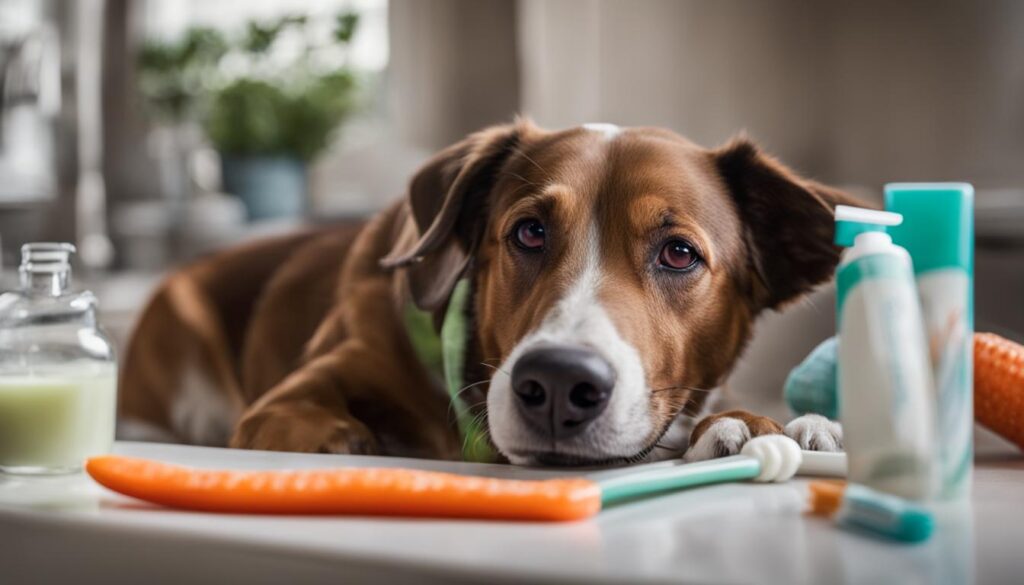
Maintaining good oral hygiene for dogs is essential to prevent dental problems and promote overall oral health. Here are some dental care tips to keep your furry friend’s teeth healthy and prevent cavities:
- Daily Tooth Brushing: Brush your dog’s teeth daily using a pet-friendly toothpaste and toothbrush. This helps remove plaque and prevent the formation of tartar, reducing the risk of cavities.
- Regular Wellness Exams: Schedule regular check-ups with your veterinarian to monitor your dog’s dental health. Your vet can examine their teeth, identify any early signs of dental issues, and provide appropriate treatments.
- Monitor Teeth for Abnormalities: Regularly examine your dog’s teeth for any signs of discoloration, bad odor, or loose teeth. These could be indications of dental problems that require attention.
- Dental Chews and Toys: Provide your dog with dental chews and toys specifically designed to promote oral health. These can help reduce plaque and tartar buildup, contributing to healthier teeth and gums.
By following these dental care tips, you can protect your dog’s teeth, prevent cavities, and ensure their oral health. Remember, approximately 80% of dogs over the age of three have some form of dental disease, so proactive dental care is crucial.
Take Action for Your Dog’s Oral Health
Prioritize your dog’s dental care by implementing a regular dental routine and providing them with appropriate dental products. Consult with your veterinarian for personalized advice and guidance on maintaining optimal oral health for your furry companion.
Special Considerations for Dog Cavity Prevention
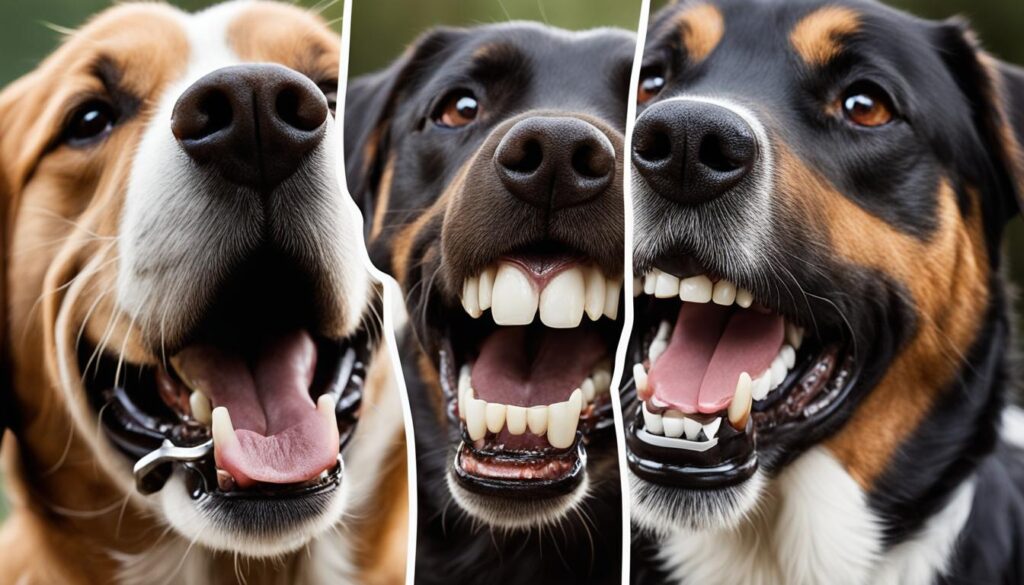
When it comes to dog dental health, preventing cavities is an important aspect of maintaining their overall oral hygiene. While dogs have a lower risk of developing cavities compared to humans, there are still special considerations to keep in mind.
One of the key factors that contributes to dogs’ lower cavity risk is their diet. Dogs typically have a protein-based diet that is low in sugars, reducing the likelihood of cavity-causing bacteria. This natural diet helps keep their teeth healthier and less prone to decay.
Additionally, the shape of dogs’ teeth plays a role in preventing cavities. Their teeth have smoother surfaces and fewer crevices, making it harder for bacteria to hide and cause tooth decay. This inherent feature of their teeth provides an added layer of protection against cavities.
It’s important to note that while dogs may have a lower risk of cavities, they are still susceptible to other dental problems, such as periodontal disease. Therefore, maintaining a good dental care routine is crucial for their overall oral health. Regular teeth brushing, providing dental chews and toys, and scheduling regular veterinary check-ups are all essential components of preventing not only cavities but also other dental issues.
By taking these special considerations into account and prioritizing your dog’s dental health, you can help ensure that they have a bright and healthy smile for years to come.
Signs of Cavities in Dogs
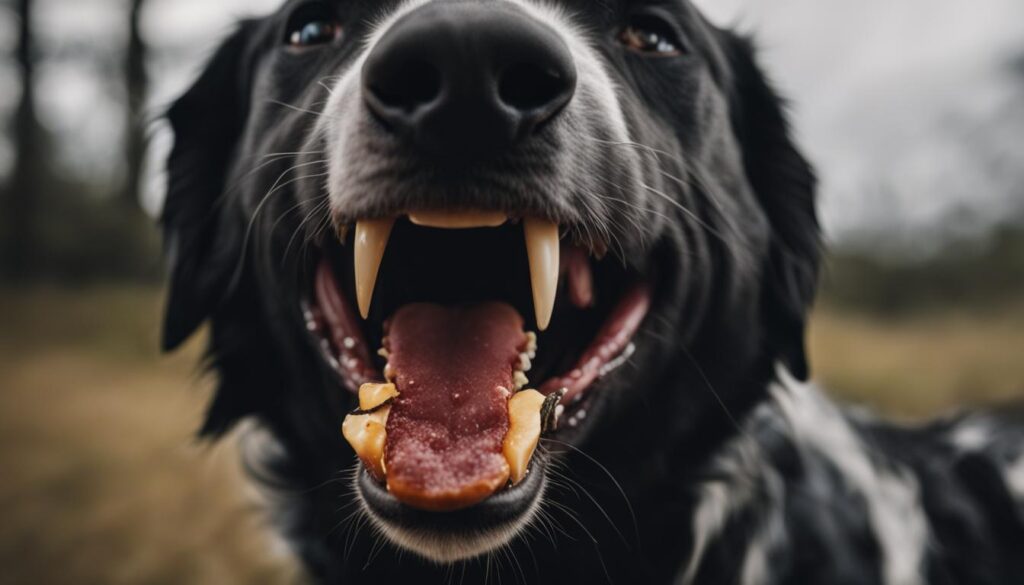
Cavities in dogs are rare, but it is still important to know the signs to watch for. While cavities may appear as small, darker holes on the tooth’s surface, they can be difficult to spot. It is essential to be aware of other common signs that indicate dental issues in dogs.
- Discoloration: Changes in the color of the teeth can be an indication of dental problems, including cavities. Look out for dark spots or areas of discoloration on your dog’s teeth.
- Plaque and tartar buildup: Excessive plaque and tartar accumulation can lead to dental issues in dogs. Keep an eye out for visible plaque and tartar on the teeth, especially along the gumline.
If you notice any abnormalities in your dog’s mouth or suspect a cavity, it is essential to consult with a veterinarian for a dental examination. They will be able to assess your dog’s dental health and provide appropriate treatment options if necessary.
Quote:
“Regularly examining your dog’s teeth and being aware of the signs of dental problems, including cavities, can help maintain their oral health and overall well-being.” – Dr. Emily Wilson, DVM
| Signs of Cavities in Dogs | Common Signs of Dental Problems in Dogs |
|---|---|
| Small, darker holes on the tooth’s surface | Discoloration of teeth |
| Plaque and tartar buildup |
Dental Treatments for Cavities in Dogs
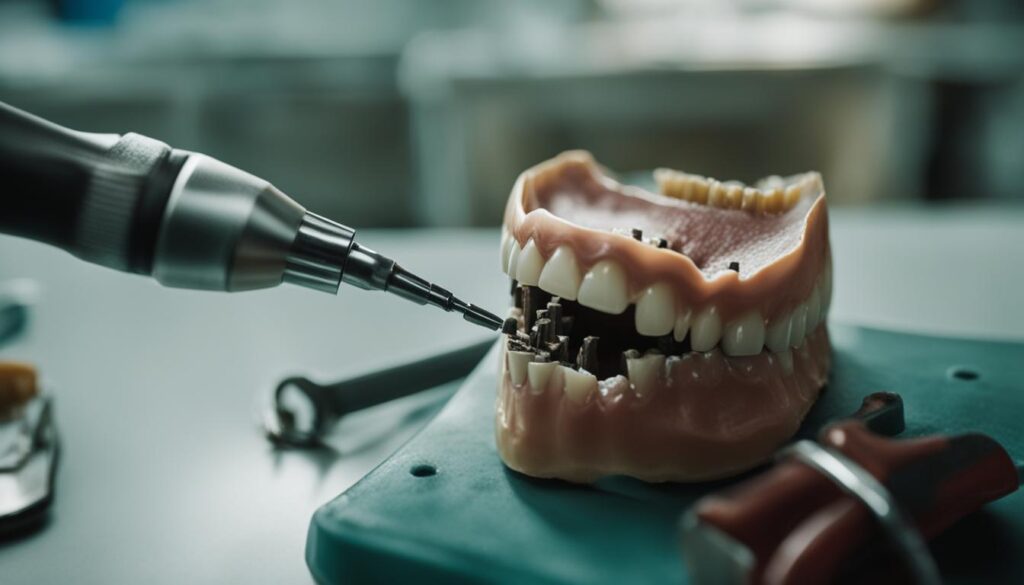
The treatment options for cavities in dogs depend on the severity of the cavity and associated damage. When it comes to treating cavities in dogs, there are two main options: tooth extraction and root canal therapy.
“Tooth extraction and root canal therapy are the main treatments for cavities in dogs.”
If the cavity is severe and the tooth cannot be saved, the veterinarian may recommend tooth extraction. This involves surgically removing the affected tooth to prevent further complications and alleviate pain. While tooth extraction may be necessary in some cases, it’s important to note that dogs can still eat and function normally without the extracted tooth.
If the cavity is in an otherwise healthy tooth and can be saved, the veterinarian may recommend root canal therapy. This involves removing the infected and diseased tissues from the tooth’s root canal and filling it with a biocompatible material. Root canal therapy can save the tooth and prevent the need for extraction, allowing the dog to maintain normal chewing function.
Following dental cavity treatments, it is crucial to monitor the dog for any post-surgery complications and provide appropriate pain relief medication. Additionally, a temporary change in diet may be recommended to ensure that the dog’s mouth heals properly. It’s important to follow the veterinarian’s post-treatment instructions to ensure the dog’s successful recovery.
Regular follow-up appointments with the veterinarian are essential to monitor the healing process and make any necessary adjustments to the treatment plan. These appointments allow the veterinarian to assess the dog’s overall dental health and address any other dental issues that may arise.
| Treatment Options: | Pros: | Cons: |
|---|---|---|
| Tooth Extraction | – Removes the affected tooth and prevents further complications – Relieves pain |
– Loss of tooth – Adjusting to eating without the extracted tooth |
| Root Canal Therapy | – Saves the affected tooth – Maintains normal chewing function – Preserves the dog’s natural dentition |
– More complex procedure – Higher cost compared to tooth extraction |
Tips for Maintaining Your Dog’s Dental Health
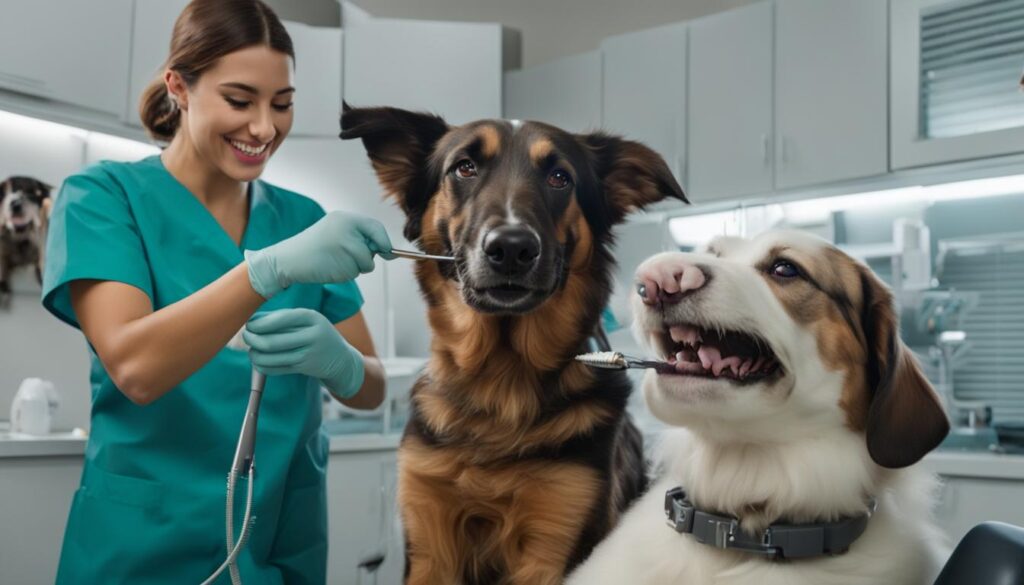
In addition to preventing cavities, there are other essential steps to maintaining your dog’s dental health. Regular brushing, providing dental chews and toys, and scheduling regular wellness exams are all important for ensuring optimal oral hygiene for dogs.
1. Regular Brushing
One of the most important aspects of dog dental care is regular brushing. Just like humans, dogs need their teeth brushed to remove plaque and tartar buildup. Invest in a pet-friendly toothpaste and toothbrush designed specifically for dogs. Begin slowly by introducing your dog to the taste and texture of the toothpaste, gradually working up to brushing their teeth at least two to three times a week. Brushing your dog’s teeth can help prevent cavities and other dental problems.
2. Providing Dental Chews and Toys
Dental chews and toys can play a significant role in maintaining your dog’s dental health. These specially designed products help reduce plaque and tartar buildup by providing a chewing action that helps clean the teeth. Look for dental treats and toys that are recommended by veterinarians and specifically aimed at promoting oral hygiene for dogs. Regular use of dental chews and toys can contribute to preventing cavities and improving overall dental health.
3. Regular Wellness Exams and Dental Examinations
Regular veterinary check-ups are essential for your dog’s overall health, including their dental well-being. During these exams, your veterinarian will conduct a thorough dental examination to identify any signs of dental issues or cavities. They may also recommend professional dental cleanings if necessary. Regular dental check-ups and cleanings can help prevent and detect cavities, allowing for early intervention and treatment.
4. Observing Changes in Oral Health
Being proactive and observant about your dog’s oral health is crucial. Watch out for signs such as bad breath, loose teeth, excessive drooling, or difficulty chewing. These can be indicators of dental problems, including cavities. If you notice any abnormalities, it is important to seek veterinary care promptly to address the issue before it worsens.
| Maintaining Your Dog’s Dental Health Checklist |
|---|
| Regular brushing with pet-friendly toothpaste and brush |
| Providing dental chews and toys |
| Scheduling regular wellness exams with dental examinations |
| Observing changes in your dog’s oral health |
Importance of Professional Dental Cleanings for Dogs
Professional dental cleanings performed by a veterinarian are essential for maintaining your dog’s dental health. These cleanings involve a thorough dental examination, scaling to remove plaque and tartar, and polishing to create a smooth tooth surface. In some cases, X-rays may be taken to assess the tooth root and surrounding bone. Professional cleanings can help prevent and treat dental issues, including cavities, and should be part of your dog’s overall dental care routine.
During a professional dental cleaning, your veterinarian will carefully examine your dog’s teeth, gums, and oral cavity for any signs of dental disease. This examination allows for early detection of potential issues before they become more serious. Additionally, scaling is performed to remove plaque and tartar buildup from the tooth surfaces and below the gumline. This process helps prevent the progression of periodontal disease, which can lead to tooth loss and other oral health problems.
The polishing step of the cleaning involves using a specialized dental paste to create a smooth and shiny tooth surface. This not only enhances the appearance of your dog’s teeth but also helps reduce the adherence of new plaque and tartar. X-rays may be recommended to evaluate the condition of the tooth roots and surrounding bone, providing a more comprehensive assessment of your dog’s dental health.
Professional dental cleanings are especially important for preventing and treating cavities in dogs. While cavities are rare in dogs, they can still occur and contribute to oral pain, tooth sensitivity, and other complications. Regular cleanings can help remove any existing cavities and prevent new ones from developing.
By ensuring your dog receives regular professional dental cleanings, you can help maintain their oral health and prevent the progression of dental disease. This not only promotes a healthier mouth but also contributes to your dog’s overall well-being. Incorporate professional dental cleanings as a vital part of your dog’s dental care routine to ensure they have a happy and healthy smile for years to come.
| Benefits of Professional Dental Cleanings for Dogs |
|---|
| Thorough dental examination by a veterinarian |
| Removal of plaque and tartar buildup |
| Polishing for a smooth tooth surface |
| X-rays to assess tooth roots and bone |
| Prevention and treatment of cavities |
The Role of Genetics in Dog Dental Health
Genetics can play a significant role in a dog’s dental health. Certain breeds of dogs may be more susceptible to dental issues, including cavities, due to their genetic makeup. For example, German Shepherds are known to have a higher risk of developing cavities compared to other breeds. Understanding the breed-specific dental risks can help pet owners take appropriate preventive measures to maintain their dog’s dental health.
Dental issues in specific breeds can be attributed to various genetic factors. Some breeds may have inherited traits that make them more prone to certain dental conditions. These genetic factors can affect the structure and development of the teeth, gums, and overall oral health. By being aware of the potential dental issues associated with specific breeds, pet owners can take proactive steps to prevent and manage these conditions.
Regular dental care, including daily tooth brushing and annual professional cleanings, is crucial for dogs with a higher genetic predisposition to dental problems. An effective dental care routine can help reduce the risk of cavities and other dental issues. Additionally, providing appropriate dental toys, chews, and diet can also contribute to maintaining your dog’s dental health.
| Breed | Dental Issues |
|---|---|
| German Shepherds | Higher risk of cavities |
| Poodles | Tendency for tooth decay |
| Chihuahuas | Prone to gum disease |
| Bulldogs | Brachycephalic dental issues |
It’s important to note that while genetics can influence a dog’s dental health, it’s not the sole determining factor. Regular dental care, appropriate diet, and professional cleanings are crucial for maintaining good oral health in all breeds. By understanding the role of genetics in a dog’s dental health and implementing preventive measures, pet owners can help ensure their furry companions have healthy teeth and gums.
The Importance of Preventive Dental Care for Dogs
Preventive dental care is crucial for maintaining your dog’s oral health and preventing dental issues, including cavities. By taking proactive measures and developing a comprehensive dental care routine, you can ensure your dog has a healthy smile and overall well-being.
Here are some important steps you can take to prevent dental diseases in dogs:
- Daily tooth brushing: Brushing your dog’s teeth daily with a pet-friendly toothpaste helps remove plaque and prevent tartar buildup. Use a soft-bristled toothbrush and make the experience positive for your dog by rewarding them with praise or treats.
- Providing dental chews and toys: These specially designed chews and toys help reduce plaque and tartar buildup while providing mental stimulation and exercise for your dog. Look for products approved by veterinary dental associations.
- Regular veterinary check-ups: Schedule regular wellness exams for your dog, including thorough dental examinations. Your vet can spot early signs of dental diseases and provide guidance on maintaining your dog’s oral health.
By incorporating these preventive measures into your dog’s routine, you can significantly reduce the risk of dental diseases, including cavities. Remember, prevention is always better than treatment, and investing in your dog’s dental health will contribute to their overall well-being.
Quote:
“Preventive dental care plays a vital role in ensuring your dog’s oral health. By implementing a daily dental care routine and providing appropriate dental products, you can promote a lifetime of healthy teeth and gums.” – Dr. Emily Wilson, DVM
Common Dental Diseases in Dogs
| Dental Disease | Prevalence | Treatment Options |
|---|---|---|
| Periodontal Disease | Over 80% of dogs over the age of three | Professional dental cleaning, tooth extraction, antibiotics |
| Fractured Teeth | Common in active dogs | Bonding, root canal therapy, extraction |
| Cavities (Dental Caries) | Rare, less than 10% of dental problems | Tooth extraction, root canal therapy |
Remember, preventing dental diseases in dogs requires a proactive approach. With regular dental care and professional veterinary check-ups, you can ensure your dog’s oral health and provide them with a lifetime of happy smiles.
Wrapping Up
After exploring the topic of dog dental health, it is clear that dogs can indeed get cavities, although they are relatively rare compared to other dental issues such as periodontal disease. Therefore, it is essential for dog owners to prioritize preventive dental care to maintain their furry friends’ dental health.
One of the most important aspects of preventive dental care for dogs is daily tooth brushing. Just like humans, dogs need regular brushing to remove plaque and prevent the formation of tartar, which can contribute to dental problems. Regular veterinary check-ups are also crucial, as they allow for a thorough dental examination and professional teeth cleaning if necessary.
In addition to brushing and regular check-ups, providing dental chews and toys can help reduce plaque and tartar buildup. These specially designed products can engage dogs’ natural chewing instincts while promoting dental hygiene. By incorporating these preventive measures into your dog’s routine, you can help prevent cavities and other dental issues.
If you suspect that your dog may have a cavity or notice any abnormalities in their oral health, it is important to consult with a veterinarian. A dental examination can help diagnose any issues and determine the appropriate treatment, whether it be tooth extraction or root canal therapy.
In conclusion, taking care of your dog’s dental health is vital for their overall well-being. By implementing a consistent dental care routine, including daily brushing, regular check-ups, and providing dental chews and toys, you can ensure your dog maintains a bright and healthy smile. Remember, prevention is key when it comes to dog dental health!
FAQ
Can dogs get cavities?
Yes, although cavities are rare in dogs compared to other dental issues such as periodontal disease.
What is the most common dental problem in dogs?
The most common dental problem in dogs is periodontal disease, which affects over 80% of dogs over the age of three.
How is dental disease formed in dogs?
Dental disease in dogs starts with the formation of plaque, which can mineralize and form tartar, leading to gum disease and tooth loss.
How are cavities in dogs diagnosed and treated?
Cavities in dogs are diagnosed through a dental examination by a veterinarian, and treatment options may include tooth extraction or root canal therapy.
What are some tips for preventing dental problems in dogs?
Preventing dental disease in dogs involves daily tooth brushing, using special toothpaste, providing chew toys and treats, and feeding dental diets.
Are there any specific considerations for preventing cavities in dogs?
Dogs have lower cavity risks due to their diet and tooth shape, but they can still benefit from regular dental care to prevent other dental issues.
What are the signs of cavities in dogs?
Cavities in dogs may appear as small, dark holes on the tooth surface, but they can be difficult to spot. Discoloration and plaque/tartar buildup are more common signs of dental issues.
How are cavities in dogs treated?
Treatment options for cavities in dogs may include tooth extraction or root canal therapy.
What tips can help maintain my dog’s dental health?
Regular brushing, providing dental chews and toys, and having regular veterinary check-ups are important for maintaining your dog’s dental health.
How important are professional dental cleanings for dogs?
Professional dental cleanings performed by a veterinarian are essential for preventing and treating dental issues in dogs.
Can genetics affect a dog’s dental health?
Yes, certain breeds may be more prone to dental issues, including cavities, due to their genetic makeup.
Why is preventive dental care important for dogs?
Preventive dental care is crucial for maintaining a dog’s oral health, preventing dental issues, and ensuring their overall well-being.






